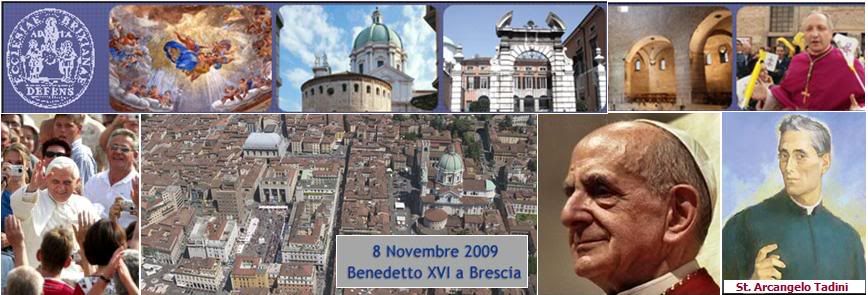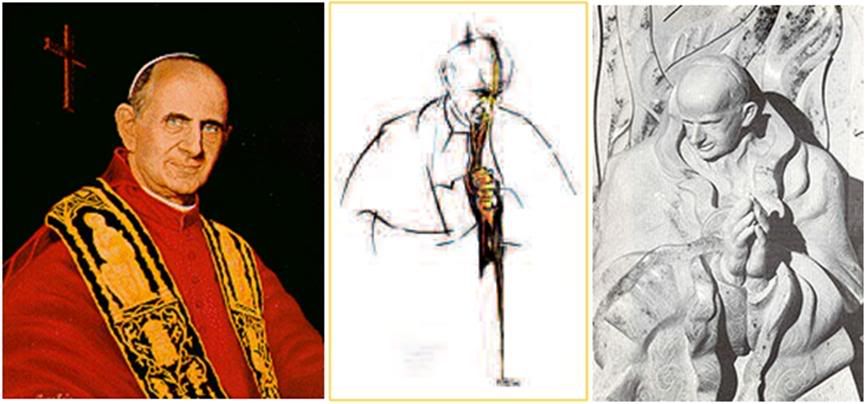

 Benedict XVI in the land of Montini -
Benedict XVI in the land of Montini -
the Pope who was 'thankful to be Brescian'
by Giselda Adornato
Translated from

Nov. 7, 2009
 Above, left: 1965 portrait by Morris Katz; center, from a diocesan brochure; right, sculpture in the Cathedral of Milan.
Above, left: 1965 portrait by Morris Katz; center, from a diocesan brochure; right, sculpture in the Cathedral of Milan.
Below, 'the land of Montini' - left, Brescia; right, Concesio.

Tomorrow, Nov, 8, Benedict XVI will make a pastoral visit to Brescia - in the morning, he will celebrate Mass at the Piazza Paolo VI, and in the afternoon, he will go to Concesio, birthplace of teh late Pope, 8 kms from the center of Brescia, where he will inaugurate the new headquarters of the Istituto Paolo VI, an international center for studies and documentation founded one year after the Brescian Pope's death.
The Pope's visit will be very much defined by the memory of his predecessor, so it is worth while to recall the ties that bound Paul VI to this land.
Attachment to the family, to the roots of the Brescian Catholic world, to the teachers of this land, are all fundamental elements for the life experiences of Giovanni Battista Montini.
As Pope, whenever he had occasion to meet with Brecians at the Vatican, he never failed to express his regret at the long years he had been away from his home town. In 12970, he said he felt "like someone asleep for long years who wakes up with everything changed around him, but thinks he is still where he was when he fell asleep. But he is surprised that he does not recognize anyone nor the things around him. He feels a stranger in his own home, and realizes the devouring and regenerative powers of time.
Labuntur anni! - The years glide by. I have missed Brescia for more than 50 years, and my memories stop in my youth..."
Giovanni Battista Montini was born in Concesio on Sept. 26, 1897. His father Giorgio (1860-1943) was one of the most important figures in Brescian Catholic action in his time. Having become editor of the newspaper
Il cittadino di Brescia when he was only 21, he became one of the founders of the Partito Popolare and a deputy in the regional Parliament.
His mother, Giuditta Alghisi (1874-1943) was also a committed Catholic activist and president of the Catholic Women's league of Brescia.
Battista, as he was always called by his family, was in poor health because of heart problems that he generally overcame, in the country surroundings of the Montini home in Concesio even through his seminary years before the First World War.

The marker on the house in Concesio reads: "In this house was born, on September 26 in the year 1897, Giovanni Battista Montini who was elevated to become Supreme Pontiff with the name Paul VI. He announced to the world a civilization of love which he learned as a boy behind these walls".
Four weeks before he died in 1978, Paul VI wrote his cousin Vittorio Montini: "(I remember) our old Concesio. unforgettable with the dear and pious memories of those most venerated persons who await us in the communion of eternity! Oh, how I have always felt them present, and how I now feel them very near!"
But the center stage in Montini's daily life as a youth was Brescia, since 1907, near the Shrine of the Madonna delle Grazie, where don Battista would later celebrate his first Mass (and is now the seat for the diocesan postulation for the cause of his beatification).
In that church, he received his first Communion under the care of the Sisters of Maria Bambina (young Mary). He was confirmed in the chapel of the Collegio Cesare Arici, then under the Jesuits, where he had his elementary and intermediate education from 1902-1913. He earned his high school certificate from the classical Liceo Arnaldo da Brescia in 1916, entering the diocesan seminary in October, in the midst of the war.
In these Brescian years, a great circle of family, friends, and teachers transmitted to the youth a faith that was free, strong and loyal, as well as a great attachment to the Church adn to the Papacy.
Brescia was experiencing a time of unparalleled fervor in the educational, social and religious commitment of its Catholic community, although its Catholic lay faithful had been among the most organized in Italy since the mid-19th century.
In the center of Catholic life were religious formation and concern for education. There was the Catholic Youth Circle, whose members included Giuseppe Tovini (now a Blessed) and the future Pope's father Giorgio Montini. Spiritual exercises were widespread. The sisters Elisabetta and Maddalena Girelli (whose process of beatification is also under way) refounded the community of St. Angela Marici. Many popular Catholic publications came out aimed at women. Rural cooperatives and the Banca San Paolo founded by Tovini were active in assisting farmers and artisans.
This lively diocese, in Montini's youth, was led by bishops Giacomo Corna Pellegrini (1827-1913) and Giacinto Gaggia (1847-1933), both great promoters of priestly vocations and of committed lay faithful. Mons. Gaggia followed closely the formative itinerary of Montini, setting him an example of doctrine, humanity and spirituality.
Under those two bishops, new Catholic publications and institutions flourished, like the magazine
La Madre Cattolica, the weekly
Pro Familia, the publishing house Queriniana, the Pious Institute for Poor Artisans, the publishing house La Scuola, which was managed for 50 years by Mons Angelo Iammarchi, who delivered the homily at don Montini's first Mass.
These activities were not hampered in the Fascist years, but although they lost their newspaper and their various Circles, carried on with their mission of 'shaping consciences' through the publishing house Morcelliani, which promoted great contemporary Catholic thinkers like Jacques Maritain and Romano Guardini.
The Montini homes in Brescia and in Concesio functioned as hearths for these Catholic movements, which were undoubtedly very important to the formation of the young Montini.
Especially influential was his assiduous assistance at the Oratorio della Pace, under the religious of St. Philip Neri. All his life, Montini remained particularly close to a Father Bevilacqua who would hide him in his home in Rome during the cusp between the 1920s and 1930s, when Montini was sought by the Fascists, and whom he would make a cardinal; as well as to Fr. Paolo Carosana who became his confessor.
To freqeunt the 'Pace', as the Brescians called the Oratory, meant receiving a proud and committed faith that expressed itself in catechesis and charity. Don Battista became prefect of the local Marian congregation, which was engaged in education and distributing Catholic literature. But he was also part of a local St. incent de Paul association which ran soup kitchens during the wars.
So he had quite a range of experiences in various aspects of teh apostolate. But perhaps the most important was his contributions to the newspaper
La Fionda, the organ of a cenacle fo spiritual friendships, of which Don Montini was the moral guide, promoting religion lived as the spring of renewal for society after the tragedy of the Great War. This would be supressed in 1926 under Fascism.
Amogn the palces associated with Montini's youth, one must ment6ion Chiari, a few kilometers from Brescia, where the young Battista met a community of Benedictine monks who left a strong mark on his spirit and influenced him to become a priest.
On May 29, 1920, Mons. Gaggia ordained him a priest in the Cathedral of Brescia. Don Battista thought of his future as a priest caring for souls in a parish.
But the following year, he was sent to Roem to pursue academic studies - and he would not return to Brescia again, except for visits to his family, increasingly brief; or on pastoral occasions when he was Archbishop of Milan.
But his affection remained strong for that world, an affection with a strong streak of nostalgia. In that meetign with Brescians in 1972, he voked "so many worthy persons met in Brescia during the first period of my life - admriable priests, exemplary and most courageous laymen, institutions that worked in a spirit of militant Christianity and charity, an atmosphere of faith and activity permeated by an uncommon spirit of sincere religious piety and virile civic and social sentiments... A healthy and profound religiosity which finds in the Catholic faith the spring and vigor for the characteristic Brescian virtues of directness and goodness".
He concluded: "This Pope is grateful to God and appreciative to all of you for the fact that I am Brescian".
[Modificato da TERESA BENEDETTA 07/11/2009 22:53]